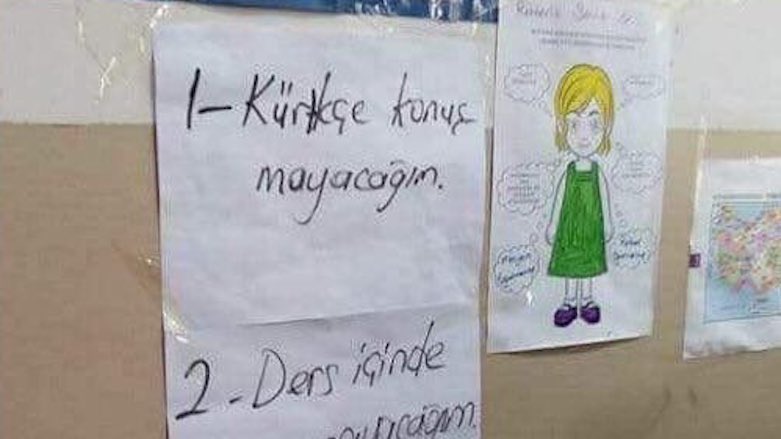Teacher bans kids from speaking Kurdish in Turkey school

ERBIL, Kurdistan Region (Kurdistan 24) – Turkey's People's Democratic Party (HDP) on Tuesday revealed that a teacher in the Kurdish-dominated province of Sirnak recently imposed a ban on mother language usage in an elementary school classroom.
HDP lawmaker representing Sirnak, Aycan Irmez, put a parliamentary question to the Minister of Education, asking if there was a directive telling teachers to prevent children from conversing in their mother tongue.
Irmez cited a photograph of the instructions on a piece of paper.
"1 - I shall not speak Kurdish.
2 - I shall not speak during the lesson.
3 - I shall not fight in the class," read instructions the unidentified teacher put on a wall in the Tumgeneral Omer Kececigil Primary School in central Sirnak.
Kurdistan 24's Turkish language service said a student parent had taken the picture and officially complained to the information desk of the Turkish Prime Ministry.
Officials had taken no action or given no response to the complaint as of Tuesday.
HDP's Irmez called the practice racist and argued that it was unconstitutional as it divided the citizens along ethnolinguistic lines.
Earlier this year, a teacher in the western Turkish city of Aydin reported six of his students to police for listening to Kurdish music and dancing, leading to their interrogation by police last week on the grounds of "disseminating terrorist propaganda."

In Turkey, successive governments imposed outright bans or suppression to a high extent on the Kurdish language, spoken in the three forms of Kurmanji, Zazaki, and Sorani (present in central Anatolia) throughout most of the 20th century Turkey since the republic's foundation in 1923.
The efforts to erase the Kurdish language and assimilate new generations gained pace in the 1930s with the opening of boarding schools in Kurdish-majority provinces where state forces were fighting rebellions, such as in Dersim and Agri.
A military junta that deposed the civilian government in 1980 brought harshest measures as it criminalized the use of Kurdish in publications and music, leading to an exodus of poets and writers to European countries.
Despite a gradual ease since the early 1990s, the lifting of a ban on Kurdish names in 2000, and further liberalization under the rule of a young Justice and Development Party (AKP), the government has reverted to former practices.
Since the failed military coup attempt against President Recep Tayyip Erdogan and his ruling AKP in 2016, authorities have shuttered scores of Kurdish language institutes, dailies, websites, TVs, including a cartoon channel for kids that was later allowed to re-air, and other media networks.
Trustees appointed by Ankara to posts of elected HDP-affiliated mayors have also removed Kurdish signboards, placards, statues, changed park names and ordered the closure of kindergartens teaching in Kurdish.
A school which gave parents grade reports in Kurdish was closed with a government state-of-emergency decree, recorded the US Department of State’s 2016 report on global human rights practices.
Turkish remains the sole official language of the republic with the Kurds, numbering over 20 million, and other ethnic groups continuing to demand education in mother tongue.
Editing by Sam A.
